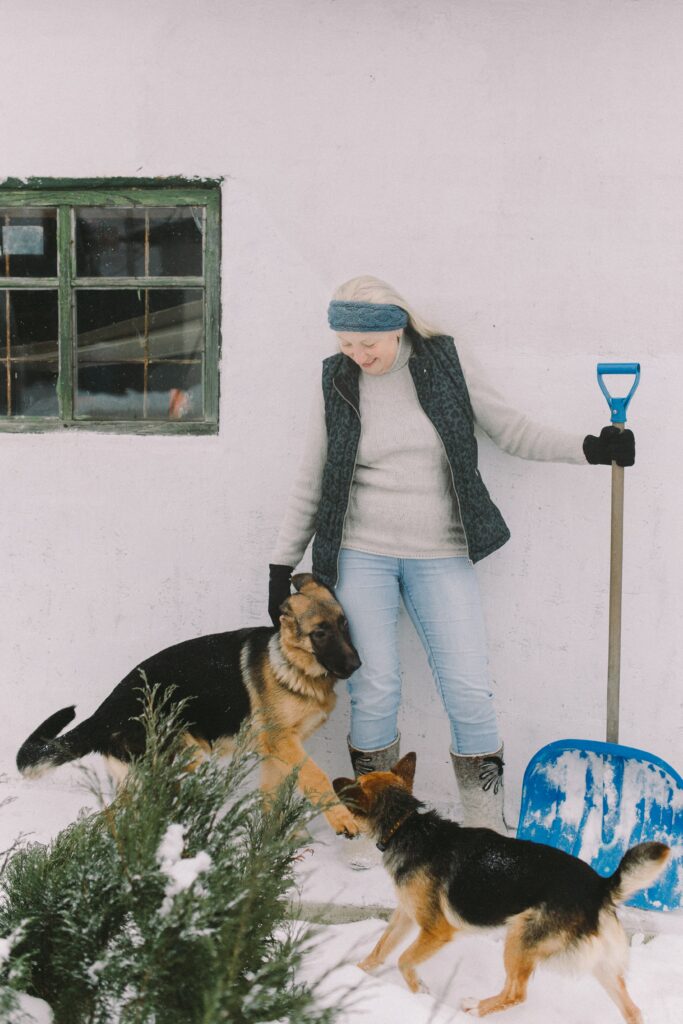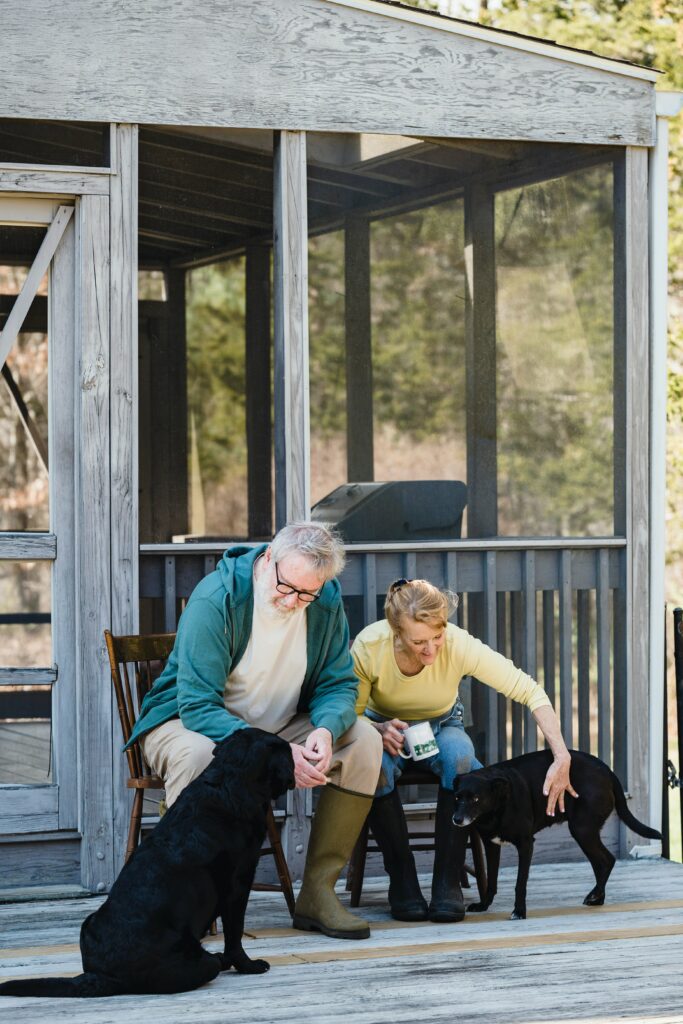Loneliness and isolation can affect seniors that live alone, especially those who are over 60 and have no family near by. According to the Journal of Nutrition For the Elderly, there is some scientific evidence which supports that seniors who live alone cope better when there is a pet in the home, including lowering the chances of cardiovascular diseases. Having a pet can keep seniors more active and affect their overall health. When a senior adopts a pet from either an animal shelter or rescue facility, there’s no doubt that both lives will be affected. The dog or cat will have a new home, while the older adult will gain companionship and have the benefits of both emotional and physical support. In fact, according to the American Heart Association, a pet in a home can help reduce the risk of heart disease, while helping seniors increase their own exercise routines and social interaction with other pet owners.
Benefits for seniors that Own a Pet

- Physical activity increased: Seniors will become more physically active because most dogs require lots of energy. They love when their owners take them on walks, play in the backyard, or stroll down to the local dog park to interact with other dogs. It is not only good for the dog, but it gets the senior outside and enjoying the fresh air.
- Mental health: Although we are talking more of the senior’s mental health, having a pet can benefit both parties’ mental health. Believe it or not, dogs and cats can get depressed. However, interacting with your pet can releases serotonin in the brain, which helps lowers blood pressure and allows the senior to look at life in a more positive way.
- Companionship: We all need someone to spend each day with. For some seniors, the answer is getting a dog or cat to keep them company on a lonely afternoon. Some older adults can get lonely when they have no social interaction in the home. Getting a dog or cat can help eliminate that feeling of isolation and help seniors have a brighter outlook on life.
Other Benefits of Pets for Seniors
While companionship is great for both the owner and the pet, owning a pet can also give the senior a purpose to live and the responsibility to care for something other than themselves. Seniors can feel useful and needed when caring for a pet. Plus, pets can make the home feel safer and give the elderly adult a sense of security.
We all know about the increased physical activity that pets offer to seniors. But their are much more. Seniors who have pets in the home also often experience a variety of health benefits, such as decreased stress levels, lower blood pressure, a boost to their immune system, help fight against allergens, and help in overcoming anxiety, depression, and loneliness.
Tips for Seniors to keep their pet Happy and Healthy

One of the first and most important thing to do is evaluating the home life of where the pet will live. Seniors that are both physically and socially active in their community are the best fit to have a pet. Seniors who have a caregiver or close family that can help or willing to assist are also a good fit. Seniors should also be aware of the needs of the animal, such as how much is needed to care for the animal? Or does the home allow pets? For example, high-rising buildings may not be suitable for certain pets.
Another tip is picking the right type of pet. Most people will agree that dogs, cats, and certain types of birds are the best pets for seniors. Sometimes, even guinea pigs can be a good choice for seniors to choose as a pet. Dogs are great choices for those who still have plenty of energy to burn and spend time outside. However, for elderly persons that do not exercise daily due to mobility issues, then choosing a cat may be the better option. Another thing to consider is the age of the pet. No senior that is well in their 80s wants to chase down an energetic puppy! Choosing an older pet would be a better option for seniors, especially if they are using a cane or walker to get around. There is also a special program called Seniors-to-Seniors, through the Animal League, that provides adoptions at a reduced rate to senior citizens over 75.
Other quick tips:
- Look for automatic feeders and water dispensers: They can reduce the number of times you have to refill dishes.
- Find a vet that does house calls: This can be easier than having to take a pet to them.
- Don’t hesitate to ask for help when you need it: reach out to neighbors and close friends to help with walking or feeding your pet.
- Hire someone to help: whether it be a caregiver, family member, or a local in your community, there is always someone willing to help.
Can Low-income Seniors have Pets?

With many seniors on a fixed income, it can be hard to maintain regular checkups and buying the nutritional food that pets need to live healthy. However, there is hope. Depending where you live, there may be programs that can assist seniors in taking care of their beloved pets. One of these programs is sponsored by the Meals on Wheels program. They help assist homebound seniors with pet care. Some of these programs also offer grants specifically for pet owners that need assistance in paying for food, cat litter, grooming services, and Vet clinic appointments. There are also mobile pet clinics that even deliver the food to your home if you are a senior that is homebound. Some vet clinics may also offer pet insurance. This can provide help to senior pet owners by saving them hundreds or even thousands of dollars for vet services, especially when caring for a pet’s illness or injury.
For more financial assistance for seniors on taking care of a pet, you can also try to contact the Humane Society of the United States. They are known to help rescue, care for, and providing temporary shelter to animals in need. If you are eligible, they may provide financial assistance to help pay for veterinary services, such as exams and vaccinations, pet food, and sometimes shelter costs. Other resources for low-income seniors include checking local service providers, low-cost clinics, non-profit organizations, veterinary financing, and pet insurance. There is also CareCredit, used for health, wellness, and petcare. It is accepted at over 24,000 veterinary locations nationwide. Seniors can also check with their state’s SPCA office for more resources. Each provide information on how to adopt, foster, and volunteer to help animals stay happy and healthy. Seniors can also donate to the organization that has done so much to keep animals living healthy.
When is it Time to Stop Caring for a Pet
There are many benefits for seniors with Pets for seniors, but caring for a pet is challenging for elderly people living on a limited income. In these cases, it may be time to put the pet up for adoption or give it to a loved one to care for it. Here are signs to look for when to stop caring for a pet.

- You find yourself forgetting to feed your pet: No matter what type of pet you may have, keeping them properly nourished is one of the most important responsibilities for pet owners. If for any reason you can’t feed your pet, it may be time to pass the responsibility to a family member or caregiver. Look for certain signs in your pet’s behavior, such as gaining or losing weight, or attitude changes or behavior of the animal.
- You are not able to keep your home clean
Having a clean home is essential to not only your life but for your pet’s health as well. Struggling to clean the litter box, change out the bedding in a bird’s cage, or letting the dog out to the backyard could be a sign that you need assistance in caring for your beloved animal. - You are unable to take your pet for a walk
When seniors start to have mobility issues or concerns, it may not be a good time to continue to own a pet. Especially when it comes to dogs. Most dogs need to be walked daily. Those who struggle with getting out to give them the exercise they need, may want to let a caregiver to take over. - You cannot keep your pet clean or properly groomed
Certain animals can groom themselves, but some still need a little assistance. Many cats and dogs shed their hair and it can get on everything; from the living room carpet, the couch, and even on the kitchen floor. Properly grooming them can help prevent excess shedding. Plus, some pets need help with trimming their nails. But for some seniors who can’t keep up, it can be difficult. - You are unable to take your pet to the vet for care
Animals need to have regular examinations, just like people, to stay happy and healthy. This includes teeth cleanings, vaccinations, and any other healthcare needs that may need to be addressed. For those who are unable to remember to set up these appointments can be putting their pet in danger. Seeking help as soon as possible is a good start in protecting your pet’s health.